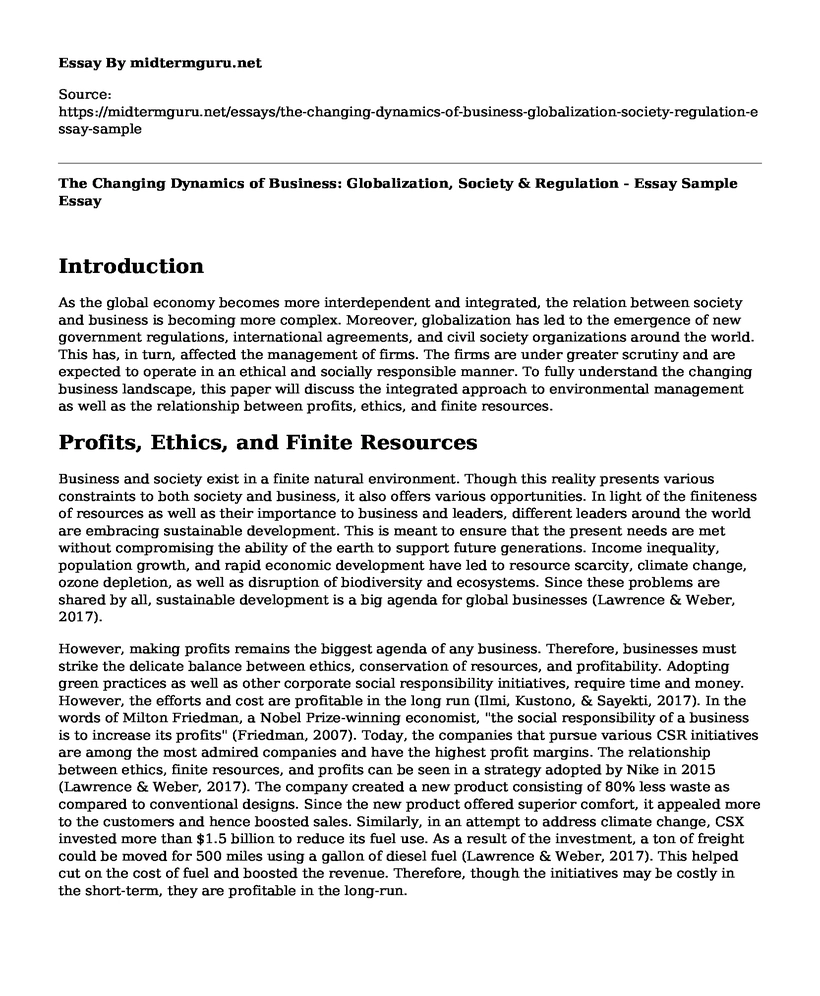Introduction
As the global economy becomes more interdependent and integrated, the relation between society and business is becoming more complex. Moreover, globalization has led to the emergence of new government regulations, international agreements, and civil society organizations around the world. This has, in turn, affected the management of firms. The firms are under greater scrutiny and are expected to operate in an ethical and socially responsible manner. To fully understand the changing business landscape, this paper will discuss the integrated approach to environmental management as well as the relationship between profits, ethics, and finite resources.
Profits, Ethics, and Finite Resources
Business and society exist in a finite natural environment. Though this reality presents various constraints to both society and business, it also offers various opportunities. In light of the finiteness of resources as well as their importance to business and leaders, different leaders around the world are embracing sustainable development. This is meant to ensure that the present needs are met without compromising the ability of the earth to support future generations. Income inequality, population growth, and rapid economic development have led to resource scarcity, climate change, ozone depletion, as well as disruption of biodiversity and ecosystems. Since these problems are shared by all, sustainable development is a big agenda for global businesses (Lawrence & Weber, 2017).
However, making profits remains the biggest agenda of any business. Therefore, businesses must strike the delicate balance between ethics, conservation of resources, and profitability. Adopting green practices as well as other corporate social responsibility initiatives, require time and money. However, the efforts and cost are profitable in the long run (Ilmi, Kustono, & Sayekti, 2017). In the words of Milton Friedman, a Nobel Prize-winning economist, "the social responsibility of a business is to increase its profits" (Friedman, 2007). Today, the companies that pursue various CSR initiatives are among the most admired companies and have the highest profit margins. The relationship between ethics, finite resources, and profits can be seen in a strategy adopted by Nike in 2015 (Lawrence & Weber, 2017). The company created a new product consisting of 80% less waste as compared to conventional designs. Since the new product offered superior comfort, it appealed more to the customers and hence boosted sales. Similarly, in an attempt to address climate change, CSX invested more than $1.5 billion to reduce its fuel use. As a result of the investment, a ton of freight could be moved for 500 miles using a gallon of diesel fuel (Lawrence & Weber, 2017). This helped cut on the cost of fuel and boosted the revenue. Therefore, though the initiatives may be costly in the short-term, they are profitable in the long-run.
Integrated Approach to Environmental Management
The growing public concern regarding sustainability has prompted corporate, civil society, and political leaders to become more responsive to environmental matters. Increasingly, government policymakers are relying more on economic incentives rather than control regulations in the quest to achieve environmental goals. Similarly, businesses around the world are adopting new approaches aimed at promoting sustainability management. Businesses are also collaborating with various advocacy groups to achieve this goal (Lawrence & Weber, 2017).
Governments around the world have come up with laws and regulations aimed at protecting the environment. To promote environment-friendly behavior, governments are giving market incentives. Though environmental laws have led to many benefits, the government must ensure that the promotion of a clean environment does not compromise the competitiveness of the economy (Lawrence & Weber, 2017). On their side, businesses are adopting various green management practices to achieve the same goal. To effectively implement the environmental management strategies, an integrated approach involving all the levels of the organization must be taken. The top leadership of the organization, sustainability managers, employees, and other stakeholders must all be engaged. Other than protecting the environment, these strategies also give the firms a competitive advantage by reducing regulatory risk, promoting innovation, attracting customers, and saving money. Recent studies have shown a positive relationship between the performance of a business and its sustainability practices (Wolf, 2014).
Conclusion
As the world's population grows and more nations pursue economic development, the pressure heaped on the earth's finite resources is mounting. Ozone depletion and climate change are some of the consequences of this pursuit. To address the issues, governments, civil societies, and businesses are working to achieve sustainable management. While such efforts are costly for businesses in the short-term, they are profitable in the long term, as evidenced by the cited examples. However, an integrated approach is needed for the successful implementation of the strategies.
References
Friedman, M. (2007). The social responsibility of a business is to increase its profits. Corporate ethics and corporate governance, 173-178. Retrieved from https://link.springer.com/chapter/10.1007/978-3-540-70818-6_14
Ilmi, M., Kustono, A. S., & Sayekti, Y. (2017). Effect Of Good Corporate Governance, Corporate Social Responsibility Disclosure and Managerial Ownership to The Corporate Value with Financial Performance as Intervening Variables: Case on Indonesia Stock Exchange. nternational Journal of Social Science and Business, 75-88. Retrieved from http://ejournal.undiksha.ac.id/index.php/IJSSB/article/view/10539
Lawrence, A. T., & Weber, J. (2017). Business and Society. Stakeholders, Ethics, Public Policy. New York: McGraw-Hill Education.
Wolf, J. (2014). The relationship between sustainable supply chain management, stakeholder pressure and corporate sustainability performance. Journal of business ethics, 119(3), 317-328. Retrieved from https://link.springer.com/article/10.1007/s10551-012-1603-0
Cite this page
The Changing Dynamics of Business: Globalization, Society & Regulation - Essay Sample. (2023, Jan 20). Retrieved from https://midtermguru.com/essays/the-changing-dynamics-of-business-globalization-society-regulation-essay-sample
If you are the original author of this essay and no longer wish to have it published on the midtermguru.com website, please click below to request its removal:
- Analysis of Experts Company - Paper Example
- Research Paper on Discrimination: Race and Color
- The Tragedy of the Commons - Essay Sample
- Paper Example on Forced Marriages in Kyrgyzstan
- Essay Sample on Importance of Intracompany User Guides
- Social and Personal Responsibility of the Rich - Essay Sample
- Essay Sample on Social Theories







